Impact of Digitalization on Business
VerifiedAdded on 2020/06/06
|9
|2669
|163
AI Summary
This assignment delves into the profound impact of digitalization on the contemporary business landscape. It explores how digital technologies are driving innovation, transforming traditional business models through e-commerce, and influencing employment patterns within various industries. The research methodology emphasizes primary data collection through questionnaires to gather insights directly from businesses.
Contribute Materials
Your contribution can guide someone’s learning journey. Share your
documents today.

RESEARCH
PROPOSAL
PROPOSAL
Secure Best Marks with AI Grader
Need help grading? Try our AI Grader for instant feedback on your assignments.
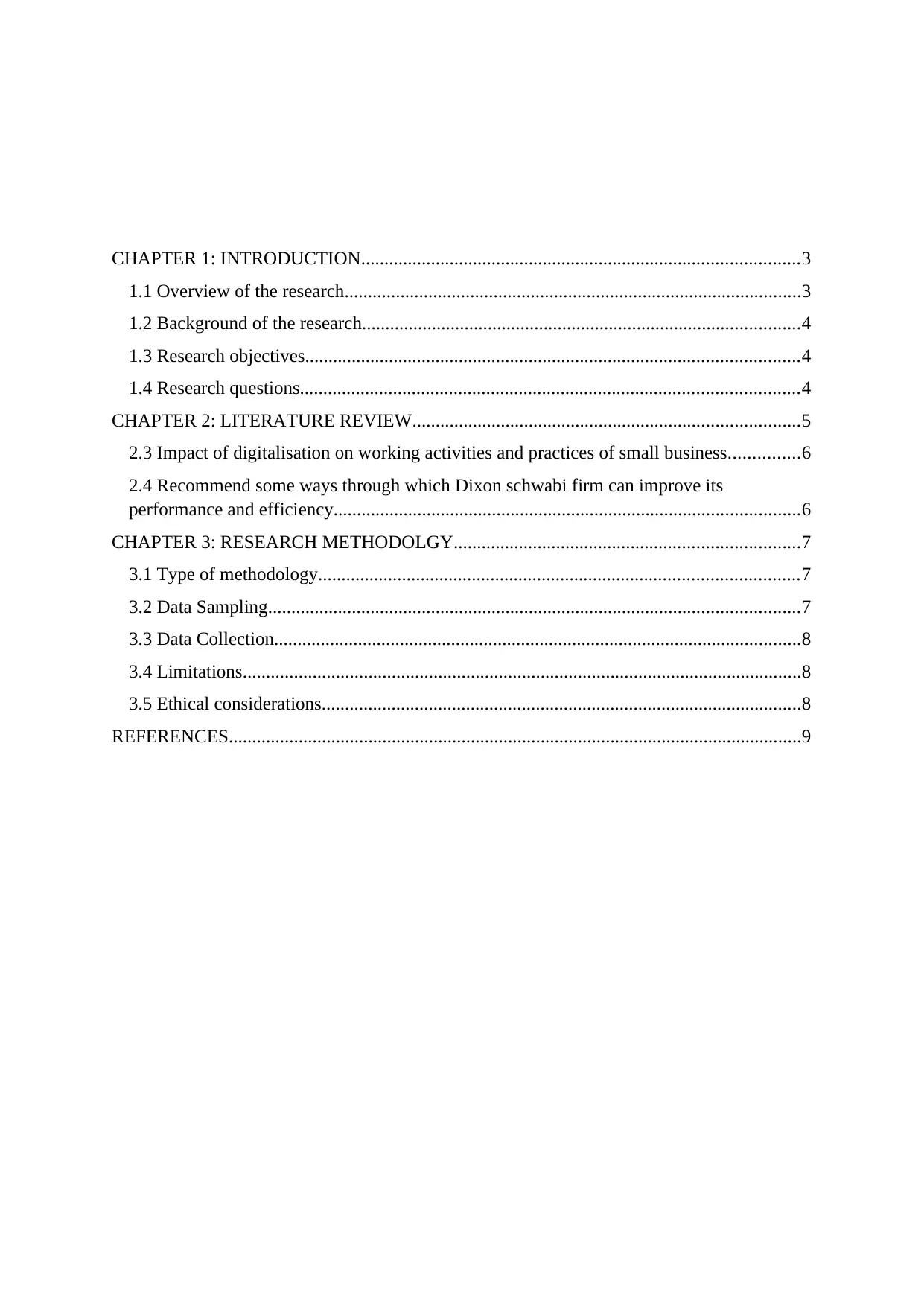
CHAPTER 1: INTRODUCTION..............................................................................................3
1.1 Overview of the research..................................................................................................3
1.2 Background of the research..............................................................................................4
1.3 Research objectives..........................................................................................................4
1.4 Research questions...........................................................................................................4
CHAPTER 2: LITERATURE REVIEW...................................................................................5
2.3 Impact of digitalisation on working activities and practices of small business...............6
2.4 Recommend some ways through which Dixon schwabi firm can improve its
performance and efficiency....................................................................................................6
CHAPTER 3: RESEARCH METHODOLGY..........................................................................7
3.1 Type of methodology.......................................................................................................7
3.2 Data Sampling..................................................................................................................7
3.3 Data Collection.................................................................................................................8
3.4 Limitations........................................................................................................................8
3.5 Ethical considerations.......................................................................................................8
REFERENCES...........................................................................................................................9
1.1 Overview of the research..................................................................................................3
1.2 Background of the research..............................................................................................4
1.3 Research objectives..........................................................................................................4
1.4 Research questions...........................................................................................................4
CHAPTER 2: LITERATURE REVIEW...................................................................................5
2.3 Impact of digitalisation on working activities and practices of small business...............6
2.4 Recommend some ways through which Dixon schwabi firm can improve its
performance and efficiency....................................................................................................6
CHAPTER 3: RESEARCH METHODOLGY..........................................................................7
3.1 Type of methodology.......................................................................................................7
3.2 Data Sampling..................................................................................................................7
3.3 Data Collection.................................................................................................................8
3.4 Limitations........................................................................................................................8
3.5 Ethical considerations.......................................................................................................8
REFERENCES...........................................................................................................................9
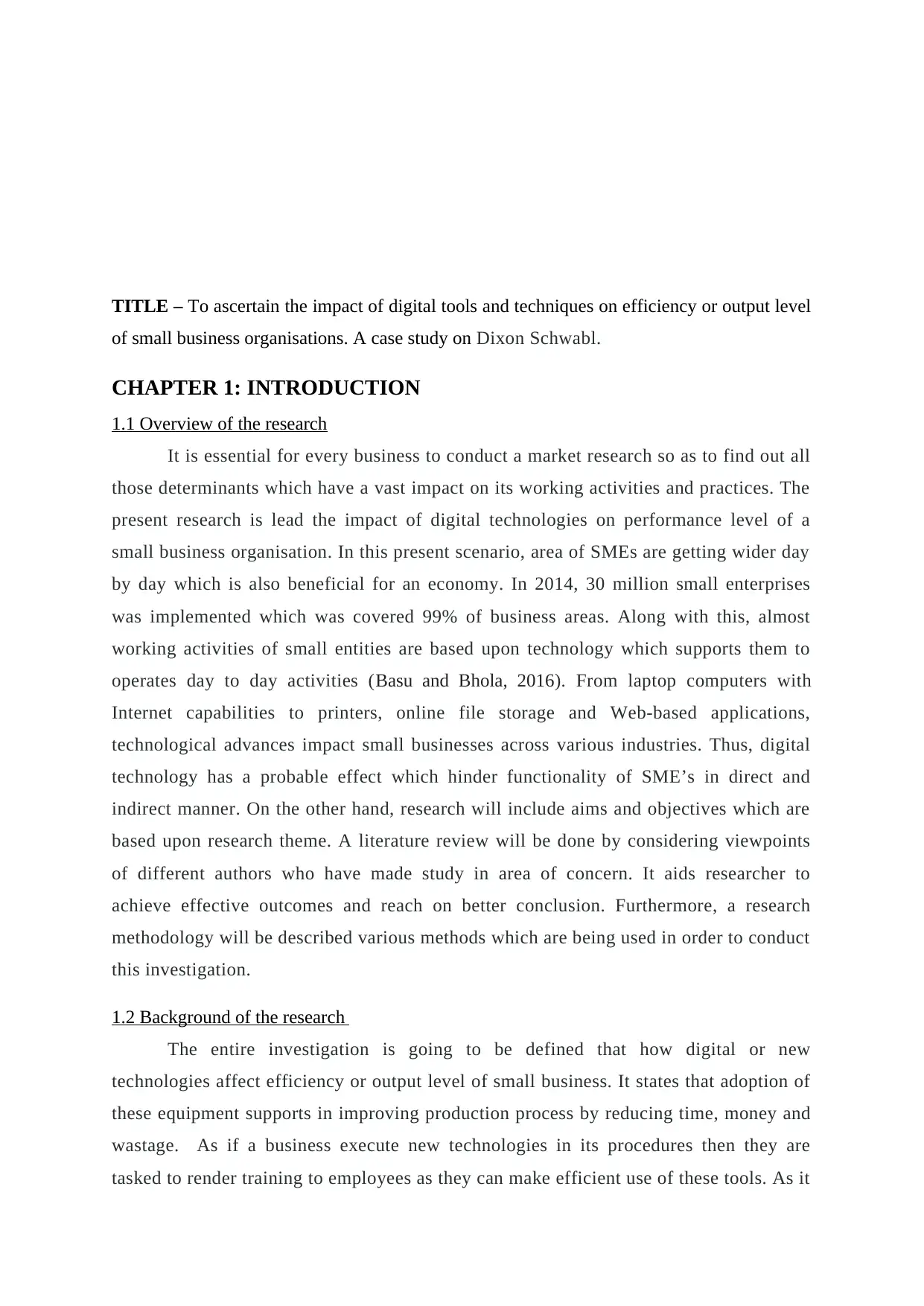
TITLE – To ascertain the impact of digital tools and techniques on efficiency or output level
of small business organisations. A case study on Dixon Schwabl.
CHAPTER 1: INTRODUCTION
1.1 Overview of the research
It is essential for every business to conduct a market research so as to find out all
those determinants which have a vast impact on its working activities and practices. The
present research is lead the impact of digital technologies on performance level of a
small business organisation. In this present scenario, area of SMEs are getting wider day
by day which is also beneficial for an economy. In 2014, 30 million small enterprises
was implemented which was covered 99% of business areas. Along with this, almost
working activities of small entities are based upon technology which supports them to
operates day to day activities (Basu and Bhola, 2016). From laptop computers with
Internet capabilities to printers, online file storage and Web-based applications,
technological advances impact small businesses across various industries. Thus, digital
technology has a probable effect which hinder functionality of SME’s in direct and
indirect manner. On the other hand, research will include aims and objectives which are
based upon research theme. A literature review will be done by considering viewpoints
of different authors who have made study in area of concern. It aids researcher to
achieve effective outcomes and reach on better conclusion. Furthermore, a research
methodology will be described various methods which are being used in order to conduct
this investigation.
1.2 Background of the research
The entire investigation is going to be defined that how digital or new
technologies affect efficiency or output level of small business. It states that adoption of
these equipment supports in improving production process by reducing time, money and
wastage. As if a business execute new technologies in its procedures then they are
tasked to render training to employees as they can make efficient use of these tools. As it
of small business organisations. A case study on Dixon Schwabl.
CHAPTER 1: INTRODUCTION
1.1 Overview of the research
It is essential for every business to conduct a market research so as to find out all
those determinants which have a vast impact on its working activities and practices. The
present research is lead the impact of digital technologies on performance level of a
small business organisation. In this present scenario, area of SMEs are getting wider day
by day which is also beneficial for an economy. In 2014, 30 million small enterprises
was implemented which was covered 99% of business areas. Along with this, almost
working activities of small entities are based upon technology which supports them to
operates day to day activities (Basu and Bhola, 2016). From laptop computers with
Internet capabilities to printers, online file storage and Web-based applications,
technological advances impact small businesses across various industries. Thus, digital
technology has a probable effect which hinder functionality of SME’s in direct and
indirect manner. On the other hand, research will include aims and objectives which are
based upon research theme. A literature review will be done by considering viewpoints
of different authors who have made study in area of concern. It aids researcher to
achieve effective outcomes and reach on better conclusion. Furthermore, a research
methodology will be described various methods which are being used in order to conduct
this investigation.
1.2 Background of the research
The entire investigation is going to be defined that how digital or new
technologies affect efficiency or output level of small business. It states that adoption of
these equipment supports in improving production process by reducing time, money and
wastage. As if a business execute new technologies in its procedures then they are
tasked to render training to employees as they can make efficient use of these tools. As it
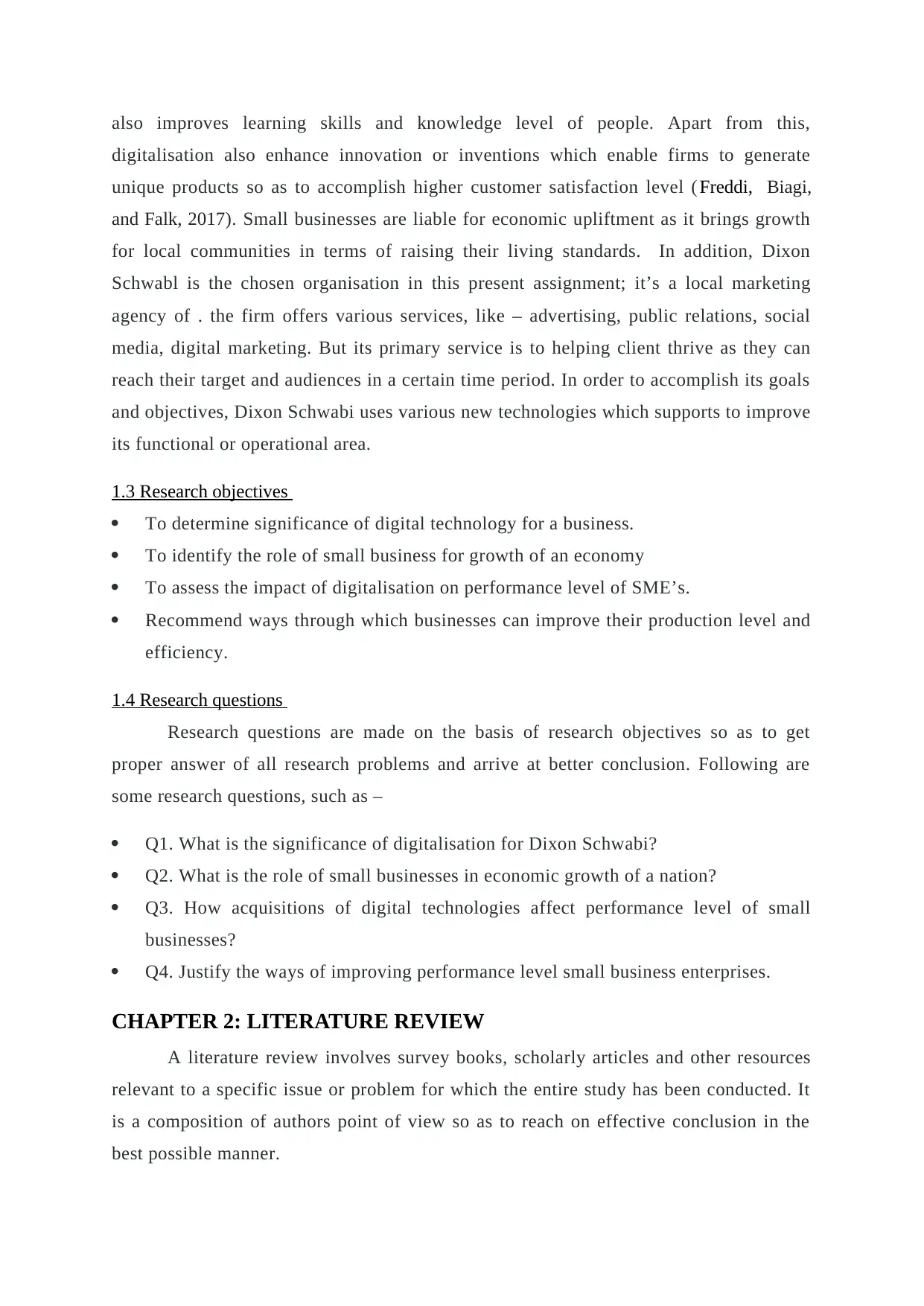
also improves learning skills and knowledge level of people. Apart from this,
digitalisation also enhance innovation or inventions which enable firms to generate
unique products so as to accomplish higher customer satisfaction level ( Freddi, Biagi,
and Falk, 2017). Small businesses are liable for economic upliftment as it brings growth
for local communities in terms of raising their living standards. In addition, Dixon
Schwabl is the chosen organisation in this present assignment; it’s a local marketing
agency of . the firm offers various services, like – advertising, public relations, social
media, digital marketing. But its primary service is to helping client thrive as they can
reach their target and audiences in a certain time period. In order to accomplish its goals
and objectives, Dixon Schwabi uses various new technologies which supports to improve
its functional or operational area.
1.3 Research objectives
To determine significance of digital technology for a business.
To identify the role of small business for growth of an economy
To assess the impact of digitalisation on performance level of SME’s.
Recommend ways through which businesses can improve their production level and
efficiency.
1.4 Research questions
Research questions are made on the basis of research objectives so as to get
proper answer of all research problems and arrive at better conclusion. Following are
some research questions, such as –
Q1. What is the significance of digitalisation for Dixon Schwabi?
Q2. What is the role of small businesses in economic growth of a nation?
Q3. How acquisitions of digital technologies affect performance level of small
businesses?
Q4. Justify the ways of improving performance level small business enterprises.
CHAPTER 2: LITERATURE REVIEW
A literature review involves survey books, scholarly articles and other resources
relevant to a specific issue or problem for which the entire study has been conducted. It
is a composition of authors point of view so as to reach on effective conclusion in the
best possible manner.
digitalisation also enhance innovation or inventions which enable firms to generate
unique products so as to accomplish higher customer satisfaction level ( Freddi, Biagi,
and Falk, 2017). Small businesses are liable for economic upliftment as it brings growth
for local communities in terms of raising their living standards. In addition, Dixon
Schwabl is the chosen organisation in this present assignment; it’s a local marketing
agency of . the firm offers various services, like – advertising, public relations, social
media, digital marketing. But its primary service is to helping client thrive as they can
reach their target and audiences in a certain time period. In order to accomplish its goals
and objectives, Dixon Schwabi uses various new technologies which supports to improve
its functional or operational area.
1.3 Research objectives
To determine significance of digital technology for a business.
To identify the role of small business for growth of an economy
To assess the impact of digitalisation on performance level of SME’s.
Recommend ways through which businesses can improve their production level and
efficiency.
1.4 Research questions
Research questions are made on the basis of research objectives so as to get
proper answer of all research problems and arrive at better conclusion. Following are
some research questions, such as –
Q1. What is the significance of digitalisation for Dixon Schwabi?
Q2. What is the role of small businesses in economic growth of a nation?
Q3. How acquisitions of digital technologies affect performance level of small
businesses?
Q4. Justify the ways of improving performance level small business enterprises.
CHAPTER 2: LITERATURE REVIEW
A literature review involves survey books, scholarly articles and other resources
relevant to a specific issue or problem for which the entire study has been conducted. It
is a composition of authors point of view so as to reach on effective conclusion in the
best possible manner.
Secure Best Marks with AI Grader
Need help grading? Try our AI Grader for instant feedback on your assignments.

2.1 Importance of digital tools and techniques
According to Firnkorn, nd Müller, (2012) in this modern aura, every firms wants to
remain competitive and successful so as to accomplish its goals and objectives in an effective
manner. For this purpose, small and large both business associations are tend to acquire
digital tools and techniques in order to boost up their operations and functionality. In respect
of Dixon Schwabi, the firm acquires numerous tools for enhancing performance level and
productivity of the company. Along with this, technology also permits a business to set up
online stores and websites for attracting large group of people in a certain time period. As it
provides ability to owners to get in touch with buyers via e-mail and social media sites and
the recognise their needs and wants in the best possible. It increases the number of customers
towards firm and raising sales as well.
2.2 Role of small business in growth and success of UK’s economy
In present scenario, even small business also generates much money than large
associations, thus it can be said that they are vital component of improving economic
condition of a nation. With this viewpoint of Abou-Shouk, Lim and Megicks, (2013) small
businesses plays a crucial role in growth and success of every economy in terms of providing
job opportunities people as they improve their living standard. Small businesses add to
economy by conveying development and advancement to the group in which the business is
built up. Private ventures likewise help fortify monetary development by giving work
chances to individuals who may not be employable by bigger organizations. Independent
ventures have a tendency to pull in ability who imagine new items or actualize new answers
for existing thoughts. Bigger organizations likewise regularly advantage from independent
ventures inside a similar nearby group, the same number of vast enterprises rely upon private
companies for the finish of different business works through outsourcing. Along with this,
Dixon Sicwabi is SME of UK which provides marketing services to various brands; the firm
has executed various new and innovative techniques which improve and enhance its
functional area. Small businesses are able to respond as well as acquire quickly market
changes as they are more customer oriented. It results, many customers remain loyal towards
their brand at the time of economic crises. In UK, SMEs also have aggregate less income than
bigger enterprises, that means chances of having less to loss are increased in the midst of
financial emergency.
According to Firnkorn, nd Müller, (2012) in this modern aura, every firms wants to
remain competitive and successful so as to accomplish its goals and objectives in an effective
manner. For this purpose, small and large both business associations are tend to acquire
digital tools and techniques in order to boost up their operations and functionality. In respect
of Dixon Schwabi, the firm acquires numerous tools for enhancing performance level and
productivity of the company. Along with this, technology also permits a business to set up
online stores and websites for attracting large group of people in a certain time period. As it
provides ability to owners to get in touch with buyers via e-mail and social media sites and
the recognise their needs and wants in the best possible. It increases the number of customers
towards firm and raising sales as well.
2.2 Role of small business in growth and success of UK’s economy
In present scenario, even small business also generates much money than large
associations, thus it can be said that they are vital component of improving economic
condition of a nation. With this viewpoint of Abou-Shouk, Lim and Megicks, (2013) small
businesses plays a crucial role in growth and success of every economy in terms of providing
job opportunities people as they improve their living standard. Small businesses add to
economy by conveying development and advancement to the group in which the business is
built up. Private ventures likewise help fortify monetary development by giving work
chances to individuals who may not be employable by bigger organizations. Independent
ventures have a tendency to pull in ability who imagine new items or actualize new answers
for existing thoughts. Bigger organizations likewise regularly advantage from independent
ventures inside a similar nearby group, the same number of vast enterprises rely upon private
companies for the finish of different business works through outsourcing. Along with this,
Dixon Sicwabi is SME of UK which provides marketing services to various brands; the firm
has executed various new and innovative techniques which improve and enhance its
functional area. Small businesses are able to respond as well as acquire quickly market
changes as they are more customer oriented. It results, many customers remain loyal towards
their brand at the time of economic crises. In UK, SMEs also have aggregate less income than
bigger enterprises, that means chances of having less to loss are increased in the midst of
financial emergency.
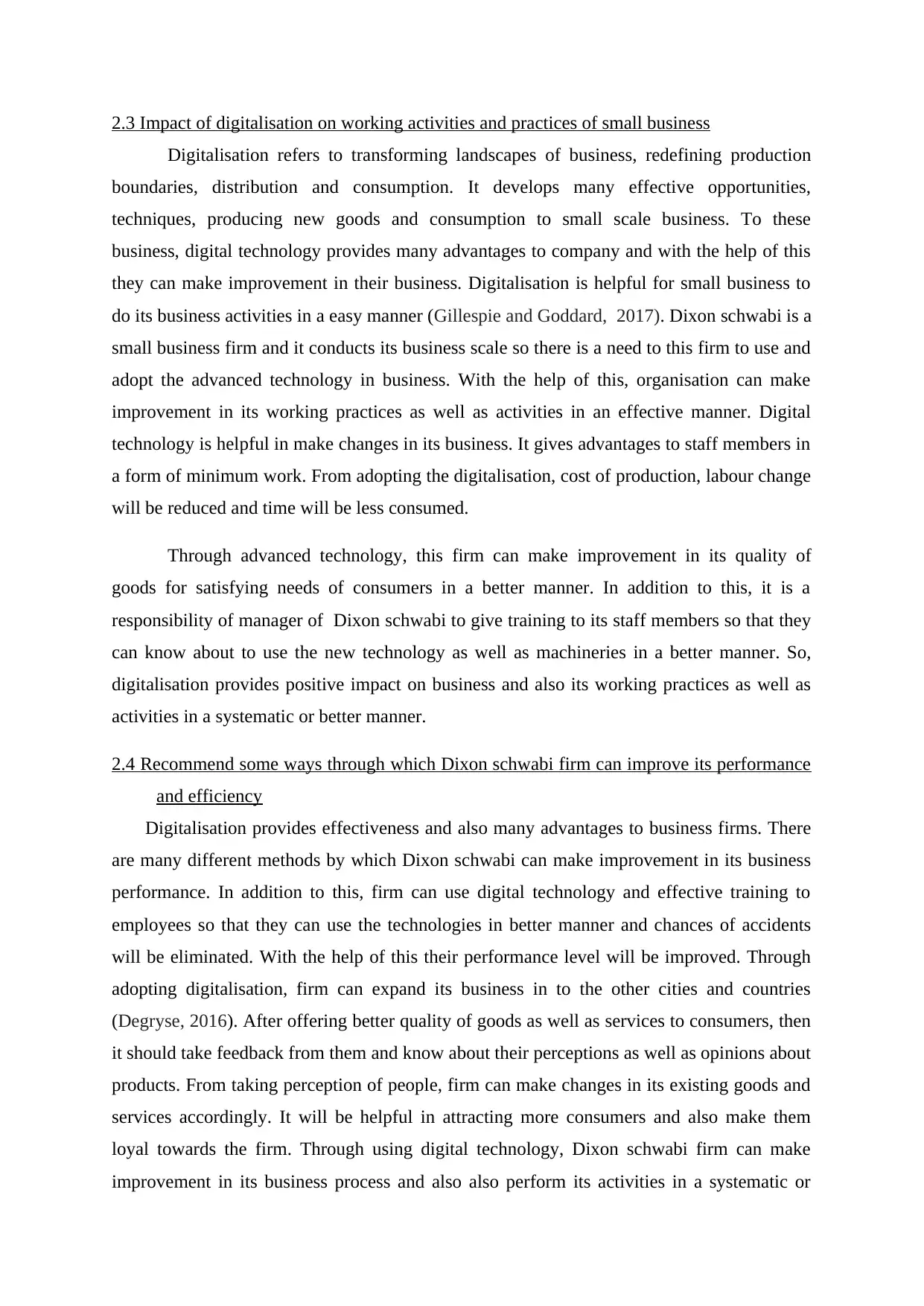
2.3 Impact of digitalisation on working activities and practices of small business
Digitalisation refers to transforming landscapes of business, redefining production
boundaries, distribution and consumption. It develops many effective opportunities,
techniques, producing new goods and consumption to small scale business. To these
business, digital technology provides many advantages to company and with the help of this
they can make improvement in their business. Digitalisation is helpful for small business to
do its business activities in a easy manner (Gillespie and Goddard, 2017). Dixon schwabi is a
small business firm and it conducts its business scale so there is a need to this firm to use and
adopt the advanced technology in business. With the help of this, organisation can make
improvement in its working practices as well as activities in an effective manner. Digital
technology is helpful in make changes in its business. It gives advantages to staff members in
a form of minimum work. From adopting the digitalisation, cost of production, labour change
will be reduced and time will be less consumed.
Through advanced technology, this firm can make improvement in its quality of
goods for satisfying needs of consumers in a better manner. In addition to this, it is a
responsibility of manager of Dixon schwabi to give training to its staff members so that they
can know about to use the new technology as well as machineries in a better manner. So,
digitalisation provides positive impact on business and also its working practices as well as
activities in a systematic or better manner.
2.4 Recommend some ways through which Dixon schwabi firm can improve its performance
and efficiency
Digitalisation provides effectiveness and also many advantages to business firms. There
are many different methods by which Dixon schwabi can make improvement in its business
performance. In addition to this, firm can use digital technology and effective training to
employees so that they can use the technologies in better manner and chances of accidents
will be eliminated. With the help of this their performance level will be improved. Through
adopting digitalisation, firm can expand its business in to the other cities and countries
(Degryse, 2016). After offering better quality of goods as well as services to consumers, then
it should take feedback from them and know about their perceptions as well as opinions about
products. From taking perception of people, firm can make changes in its existing goods and
services accordingly. It will be helpful in attracting more consumers and also make them
loyal towards the firm. Through using digital technology, Dixon schwabi firm can make
improvement in its business process and also also perform its activities in a systematic or
Digitalisation refers to transforming landscapes of business, redefining production
boundaries, distribution and consumption. It develops many effective opportunities,
techniques, producing new goods and consumption to small scale business. To these
business, digital technology provides many advantages to company and with the help of this
they can make improvement in their business. Digitalisation is helpful for small business to
do its business activities in a easy manner (Gillespie and Goddard, 2017). Dixon schwabi is a
small business firm and it conducts its business scale so there is a need to this firm to use and
adopt the advanced technology in business. With the help of this, organisation can make
improvement in its working practices as well as activities in an effective manner. Digital
technology is helpful in make changes in its business. It gives advantages to staff members in
a form of minimum work. From adopting the digitalisation, cost of production, labour change
will be reduced and time will be less consumed.
Through advanced technology, this firm can make improvement in its quality of
goods for satisfying needs of consumers in a better manner. In addition to this, it is a
responsibility of manager of Dixon schwabi to give training to its staff members so that they
can know about to use the new technology as well as machineries in a better manner. So,
digitalisation provides positive impact on business and also its working practices as well as
activities in a systematic or better manner.
2.4 Recommend some ways through which Dixon schwabi firm can improve its performance
and efficiency
Digitalisation provides effectiveness and also many advantages to business firms. There
are many different methods by which Dixon schwabi can make improvement in its business
performance. In addition to this, firm can use digital technology and effective training to
employees so that they can use the technologies in better manner and chances of accidents
will be eliminated. With the help of this their performance level will be improved. Through
adopting digitalisation, firm can expand its business in to the other cities and countries
(Degryse, 2016). After offering better quality of goods as well as services to consumers, then
it should take feedback from them and know about their perceptions as well as opinions about
products. From taking perception of people, firm can make changes in its existing goods and
services accordingly. It will be helpful in attracting more consumers and also make them
loyal towards the firm. Through using digital technology, Dixon schwabi firm can make
improvement in its business process and also also perform its activities in a systematic or
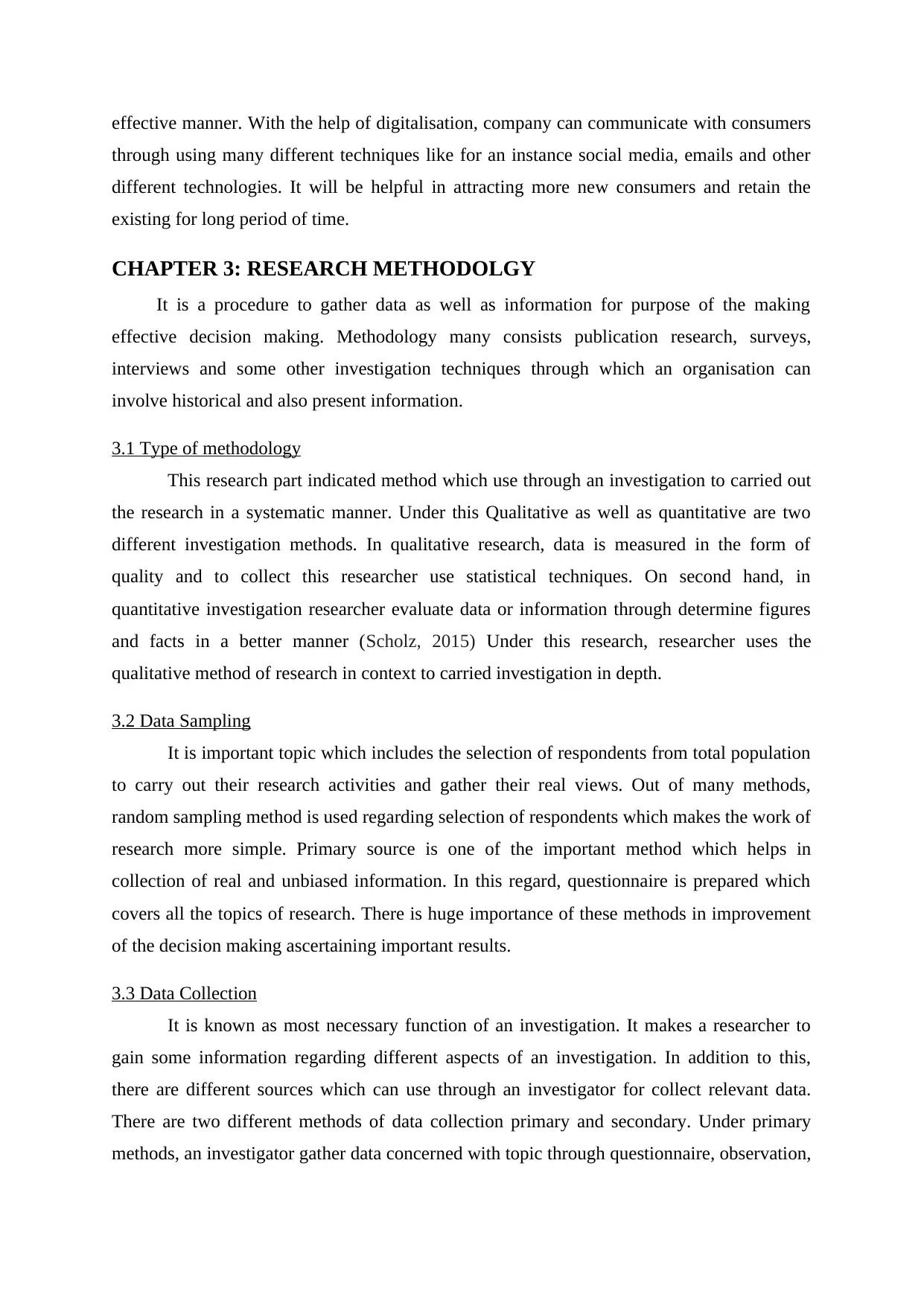
effective manner. With the help of digitalisation, company can communicate with consumers
through using many different techniques like for an instance social media, emails and other
different technologies. It will be helpful in attracting more new consumers and retain the
existing for long period of time.
CHAPTER 3: RESEARCH METHODOLGY
It is a procedure to gather data as well as information for purpose of the making
effective decision making. Methodology many consists publication research, surveys,
interviews and some other investigation techniques through which an organisation can
involve historical and also present information.
3.1 Type of methodology
This research part indicated method which use through an investigation to carried out
the research in a systematic manner. Under this Qualitative as well as quantitative are two
different investigation methods. In qualitative research, data is measured in the form of
quality and to collect this researcher use statistical techniques. On second hand, in
quantitative investigation researcher evaluate data or information through determine figures
and facts in a better manner (Scholz, 2015) Under this research, researcher uses the
qualitative method of research in context to carried investigation in depth.
3.2 Data Sampling
It is important topic which includes the selection of respondents from total population
to carry out their research activities and gather their real views. Out of many methods,
random sampling method is used regarding selection of respondents which makes the work of
research more simple. Primary source is one of the important method which helps in
collection of real and unbiased information. In this regard, questionnaire is prepared which
covers all the topics of research. There is huge importance of these methods in improvement
of the decision making ascertaining important results.
3.3 Data Collection
It is known as most necessary function of an investigation. It makes a researcher to
gain some information regarding different aspects of an investigation. In addition to this,
there are different sources which can use through an investigator for collect relevant data.
There are two different methods of data collection primary and secondary. Under primary
methods, an investigator gather data concerned with topic through questionnaire, observation,
through using many different techniques like for an instance social media, emails and other
different technologies. It will be helpful in attracting more new consumers and retain the
existing for long period of time.
CHAPTER 3: RESEARCH METHODOLGY
It is a procedure to gather data as well as information for purpose of the making
effective decision making. Methodology many consists publication research, surveys,
interviews and some other investigation techniques through which an organisation can
involve historical and also present information.
3.1 Type of methodology
This research part indicated method which use through an investigation to carried out
the research in a systematic manner. Under this Qualitative as well as quantitative are two
different investigation methods. In qualitative research, data is measured in the form of
quality and to collect this researcher use statistical techniques. On second hand, in
quantitative investigation researcher evaluate data or information through determine figures
and facts in a better manner (Scholz, 2015) Under this research, researcher uses the
qualitative method of research in context to carried investigation in depth.
3.2 Data Sampling
It is important topic which includes the selection of respondents from total population
to carry out their research activities and gather their real views. Out of many methods,
random sampling method is used regarding selection of respondents which makes the work of
research more simple. Primary source is one of the important method which helps in
collection of real and unbiased information. In this regard, questionnaire is prepared which
covers all the topics of research. There is huge importance of these methods in improvement
of the decision making ascertaining important results.
3.3 Data Collection
It is known as most necessary function of an investigation. It makes a researcher to
gain some information regarding different aspects of an investigation. In addition to this,
there are different sources which can use through an investigator for collect relevant data.
There are two different methods of data collection primary and secondary. Under primary
methods, an investigator gather data concerned with topic through questionnaire, observation,
Paraphrase This Document
Need a fresh take? Get an instant paraphrase of this document with our AI Paraphraser
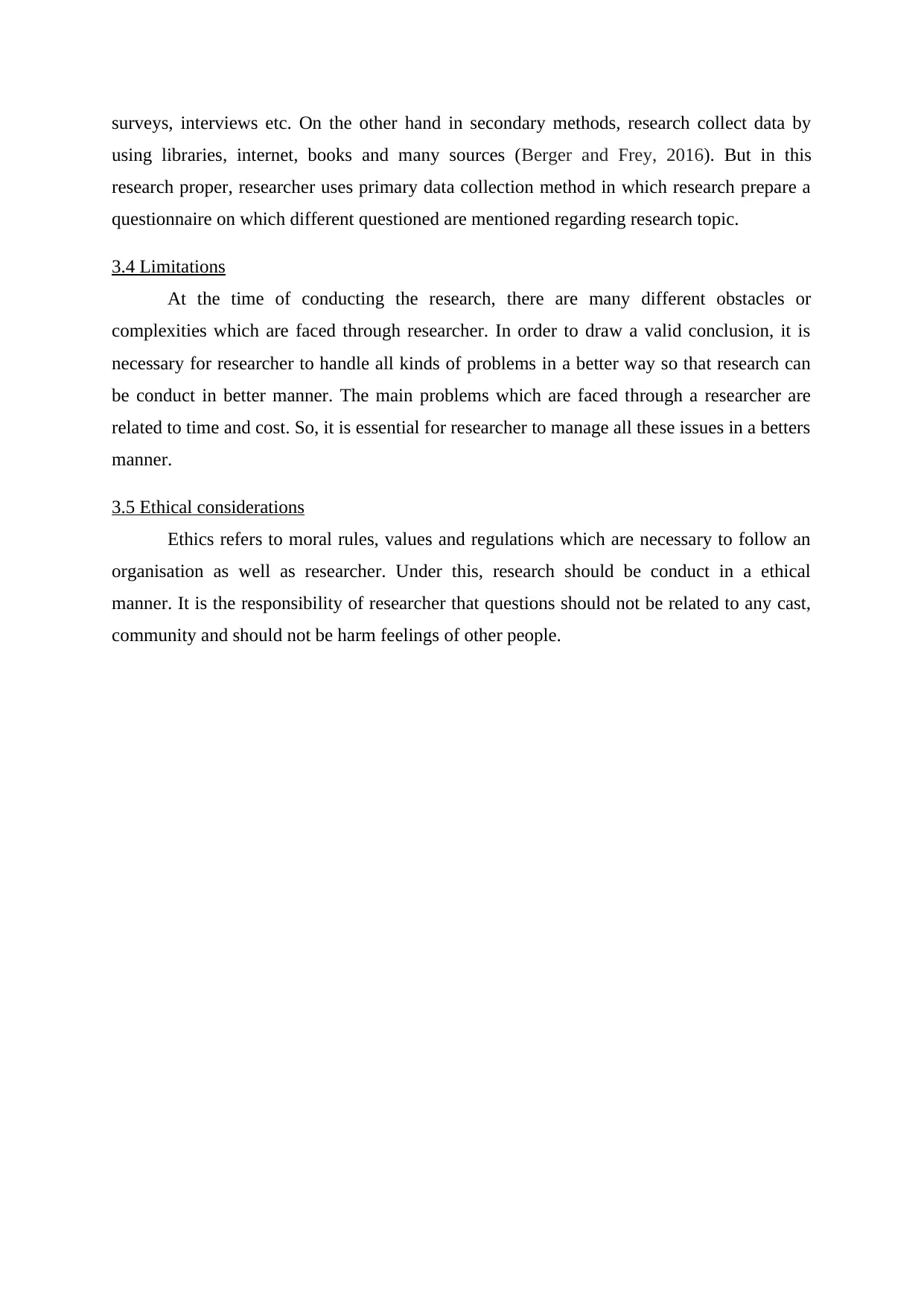
surveys, interviews etc. On the other hand in secondary methods, research collect data by
using libraries, internet, books and many sources (Berger and Frey, 2016). But in this
research proper, researcher uses primary data collection method in which research prepare a
questionnaire on which different questioned are mentioned regarding research topic.
3.4 Limitations
At the time of conducting the research, there are many different obstacles or
complexities which are faced through researcher. In order to draw a valid conclusion, it is
necessary for researcher to handle all kinds of problems in a better way so that research can
be conduct in better manner. The main problems which are faced through a researcher are
related to time and cost. So, it is essential for researcher to manage all these issues in a betters
manner.
3.5 Ethical considerations
Ethics refers to moral rules, values and regulations which are necessary to follow an
organisation as well as researcher. Under this, research should be conduct in a ethical
manner. It is the responsibility of researcher that questions should not be related to any cast,
community and should not be harm feelings of other people.
using libraries, internet, books and many sources (Berger and Frey, 2016). But in this
research proper, researcher uses primary data collection method in which research prepare a
questionnaire on which different questioned are mentioned regarding research topic.
3.4 Limitations
At the time of conducting the research, there are many different obstacles or
complexities which are faced through researcher. In order to draw a valid conclusion, it is
necessary for researcher to handle all kinds of problems in a better way so that research can
be conduct in better manner. The main problems which are faced through a researcher are
related to time and cost. So, it is essential for researcher to manage all these issues in a betters
manner.
3.5 Ethical considerations
Ethics refers to moral rules, values and regulations which are necessary to follow an
organisation as well as researcher. Under this, research should be conduct in a ethical
manner. It is the responsibility of researcher that questions should not be related to any cast,
community and should not be harm feelings of other people.
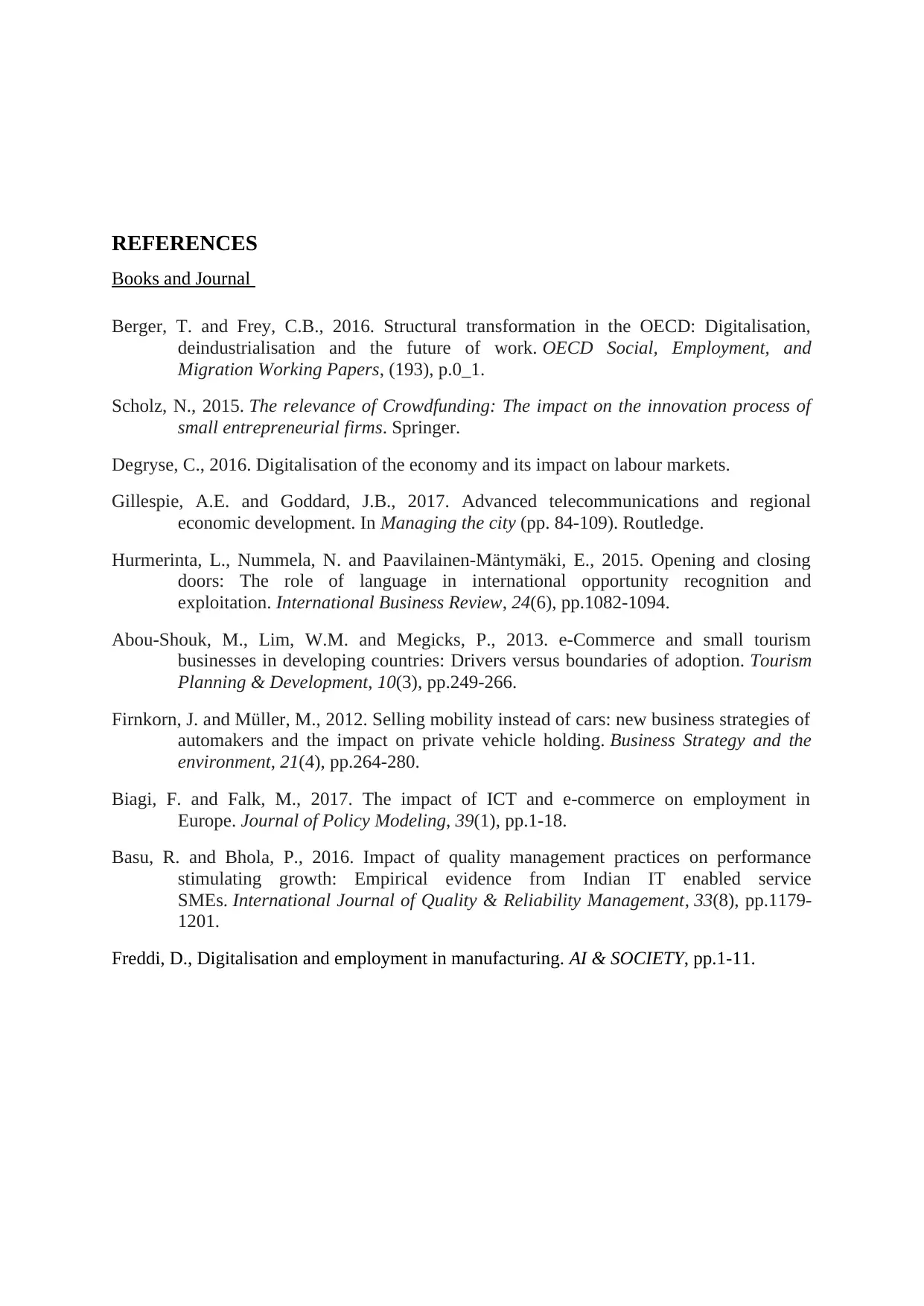
REFERENCES
Books and Journal
Berger, T. and Frey, C.B., 2016. Structural transformation in the OECD: Digitalisation,
deindustrialisation and the future of work. OECD Social, Employment, and
Migration Working Papers, (193), p.0_1.
Scholz, N., 2015. The relevance of Crowdfunding: The impact on the innovation process of
small entrepreneurial firms. Springer.
Degryse, C., 2016. Digitalisation of the economy and its impact on labour markets.
Gillespie, A.E. and Goddard, J.B., 2017. Advanced telecommunications and regional
economic development. In Managing the city (pp. 84-109). Routledge.
Hurmerinta, L., Nummela, N. and Paavilainen-Mäntymäki, E., 2015. Opening and closing
doors: The role of language in international opportunity recognition and
exploitation. International Business Review, 24(6), pp.1082-1094.
Abou-Shouk, M., Lim, W.M. and Megicks, P., 2013. e-Commerce and small tourism
businesses in developing countries: Drivers versus boundaries of adoption. Tourism
Planning & Development, 10(3), pp.249-266.
Firnkorn, J. and Müller, M., 2012. Selling mobility instead of cars: new business strategies of
automakers and the impact on private vehicle holding. Business Strategy and the
environment, 21(4), pp.264-280.
Biagi, F. and Falk, M., 2017. The impact of ICT and e-commerce on employment in
Europe. Journal of Policy Modeling, 39(1), pp.1-18.
Basu, R. and Bhola, P., 2016. Impact of quality management practices on performance
stimulating growth: Empirical evidence from Indian IT enabled service
SMEs. International Journal of Quality & Reliability Management, 33(8), pp.1179-
1201.
Freddi, D., Digitalisation and employment in manufacturing. AI & SOCIETY, pp.1-11.
Books and Journal
Berger, T. and Frey, C.B., 2016. Structural transformation in the OECD: Digitalisation,
deindustrialisation and the future of work. OECD Social, Employment, and
Migration Working Papers, (193), p.0_1.
Scholz, N., 2015. The relevance of Crowdfunding: The impact on the innovation process of
small entrepreneurial firms. Springer.
Degryse, C., 2016. Digitalisation of the economy and its impact on labour markets.
Gillespie, A.E. and Goddard, J.B., 2017. Advanced telecommunications and regional
economic development. In Managing the city (pp. 84-109). Routledge.
Hurmerinta, L., Nummela, N. and Paavilainen-Mäntymäki, E., 2015. Opening and closing
doors: The role of language in international opportunity recognition and
exploitation. International Business Review, 24(6), pp.1082-1094.
Abou-Shouk, M., Lim, W.M. and Megicks, P., 2013. e-Commerce and small tourism
businesses in developing countries: Drivers versus boundaries of adoption. Tourism
Planning & Development, 10(3), pp.249-266.
Firnkorn, J. and Müller, M., 2012. Selling mobility instead of cars: new business strategies of
automakers and the impact on private vehicle holding. Business Strategy and the
environment, 21(4), pp.264-280.
Biagi, F. and Falk, M., 2017. The impact of ICT and e-commerce on employment in
Europe. Journal of Policy Modeling, 39(1), pp.1-18.
Basu, R. and Bhola, P., 2016. Impact of quality management practices on performance
stimulating growth: Empirical evidence from Indian IT enabled service
SMEs. International Journal of Quality & Reliability Management, 33(8), pp.1179-
1201.
Freddi, D., Digitalisation and employment in manufacturing. AI & SOCIETY, pp.1-11.
1 out of 9
Related Documents
Your All-in-One AI-Powered Toolkit for Academic Success.
+13062052269
info@desklib.com
Available 24*7 on WhatsApp / Email
![[object Object]](/_next/static/media/star-bottom.7253800d.svg)
Unlock your academic potential
© 2024 | Zucol Services PVT LTD | All rights reserved.





